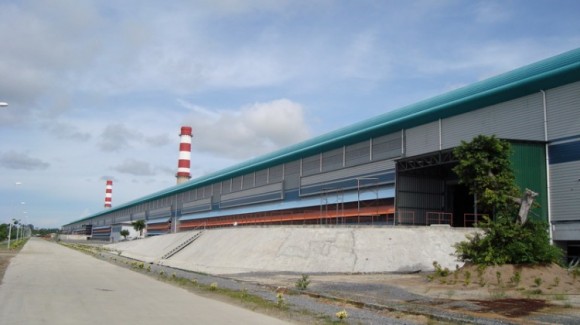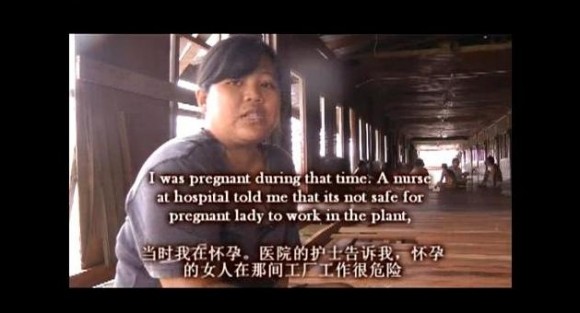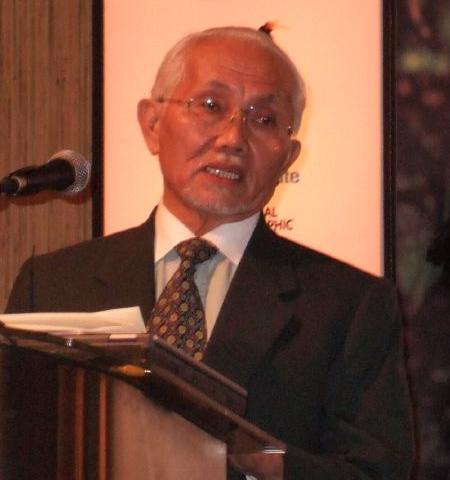Slow death by aluminum smelters?
As If Earth Matters by Gan Pei Ling
| 18 June 2012
WHILE green activists in Peninsular Malaysia are protesting the rare earth refinery that has yet to begin operations in Gebeng, Pahang, villagers living near an aluminium smelting plant in Balingian, Mukah, Sarawak, have been suffering in silence.
Documentary filmmaker and former TV2 producer Chou Z Nam has highlighted the Iban villagers’ plight in four short videos, all available on YouTube, and a report after a field visit in February 2012. Chou is well-known for his documentaries on the Bakun Dam and its impact on local communities. His Bakun Dam documentaries were axed by RTM and he was sacked after disclosing the self-censorship.
How is the aluminium smelting plant affecting the lives of local communities in Balingian? Should we be alarmed at plans for new plants?

Declining health and dying crops
In Chou’s first short video released on 22 March 2012, villager Sandy Dancan, 18, complained of skin irritation and rashes which she has had since 2010. Dancan lives 300m away from the plant owned by Press Metal Sarawak Sdn Bhd.
Another villager, Cynthia Unau, 25, worked as a cleaner at the smelter for six months in 2011. She claimed she fell sick while working there in Chou’s second video released on 24 March 2012.
A simple health survey conducted by Chou and local activist Matek Geram found that villagers from three longhouses located 300m to 2.5km from the factory reported symptoms of breathing difficulties, coughing and dizziness, among others. The affected families say they spend RM150 up to RM500 a month for medical treatment.
It was also observed that plants growing 50m to 200m from the factory including nipah, coconut, sago, banana, oil palm and ferns, were dying.
Farmers living within 12km of the smelter have claimed loss of livelihood as their crops cannot bear fruit, while fisherfolk at Batang Balingian alleged that their catch has dwindled, possibly due to acid rain pollution.
Chou’s documentary also records an unidentified former employee accusing the smelter of only using one out of its three compressors to treat air pollutants including hydrogen fluoride and sulphur dioxide in order to save energy costs. The informant claimed that although the plant was equipped with the required pollution control facility, it wasn’t fully utilised when he was working there.
Press Metal Sarawak refuted these claims in a Borneo Post report published on 8 May 2012. Its human resources general manager, Soh Siew Ong, said the smelter only released clean gas into the air and that no water is discharged from the plant.

More smelters in the pipeline
While villagers in Balingian are still grappling with the health impact of living near an aluminium plant, at least two new larger smelters are expected to be built in Bintulu.
Press Metal Bhd secured a RM350 million loan in May 2012 from two local banks to finance the construction of its second aluminium smelting plant in Bintulu’s Samalaju Industrial Park. The plant is expected to produce 240,000 tonnes of aluminium annually, double the capacity of the existing Balingian plant.
Smelter Asia, a joint venture between Gulf International Investment Group Holdings Sdn Bhd and Aluminium Corp of China, also plans to build a smelter in the same industrial park, with an even larger annual capacity of 370,000 tonnes.
Aluminium smelting involves a chemical process to extract pure aluminium from its oxide called alumina. But the process leaves behind fluoride pollutants, including the pungent and toxic hydrogen fluoride as well as perfluorocarbons (PFCs), which are far more potent greenhouse gases than carbon dioxide.
In addition, an aluminium smelting plant is an energy guzzler as a high temperature of 970 Celsius is needed to melt the alumina. For example, while the Mukah district consumes two megawatts of electricity per month, the Balingian smelter alone uses up to 200 megawatts a month, according to Press Metal Sarawak. Smelter Asia is also in talks with Sarawak Energy Bhd to secure over 600 megawatts of power supply.
Heed the warning signs
The process of extracting aluminium is an environmental challenge. Yet, aluminium is highly sought after to make vehicles and for food packaging, and is arguably a necessity in modern life. The aluminium industry is one of the primary forces behind the Brazilian government’s plan to dam rivers in the Amazon to meet the industry’s high energy demand. Sarawak seems to be going down the same path with its grand plan to build 12 mega dams despite growing local opposition.
Unlike the case with Lynas, a detailed environmental impact assessment was done for the Balingian smelter. But given the current complaints, the government authorities need to be more proactive in addressing villagers’ complaints on health problems, pollution and dying plants. These are merely warning signs of a potentially larger underlying problem. If, as Press Metal Sarawak claims, no air pollutants have been released by its smelting plant, then what is the real source of pollution in Balingian? Shouldn’t the authorities be investigating?

As Chou recommended in his fact-finding report, a more thorough
health study needs to be conducted to ascertain the cause of the
villagers’ sicknesses. Rainwater and plant samples ought to be collected
by the state Department of Environment to find out if they are
contaminated with pollutants from the smelter.
The Balingian smelter is located Sarawak Chief Minister Tan Sri Abdul Taib Mahmud’s constituency. Surely he wouldn’t want an environmental and public health scandal in his own backyard.
In addition, the Sarawak government ought to rethink its development strategy. Building more smelters may indeed spur the state’s economic growth, but not at the expense of the health and quality of life of the locals, unless the companies are held to strict environmental standards.

Gan Pei Ling thinks more public attention needs to be given to the health and environmental impact of aluminium smelting plants in Sarawak. They certainly deserve equal, if not more, public scrutiny than Lynas.
WHILE green activists in Peninsular Malaysia are protesting the rare earth refinery that has yet to begin operations in Gebeng, Pahang, villagers living near an aluminium smelting plant in Balingian, Mukah, Sarawak, have been suffering in silence.
Documentary filmmaker and former TV2 producer Chou Z Nam has highlighted the Iban villagers’ plight in four short videos, all available on YouTube, and a report after a field visit in February 2012. Chou is well-known for his documentaries on the Bakun Dam and its impact on local communities. His Bakun Dam documentaries were axed by RTM and he was sacked after disclosing the self-censorship.
How is the aluminium smelting plant affecting the lives of local communities in Balingian? Should we be alarmed at plans for new plants?

The aluminium smelting plant in Mukah (Source: unireka.com)
Declining health and dying crops
In Chou’s first short video released on 22 March 2012, villager Sandy Dancan, 18, complained of skin irritation and rashes which she has had since 2010. Dancan lives 300m away from the plant owned by Press Metal Sarawak Sdn Bhd.
Another villager, Cynthia Unau, 25, worked as a cleaner at the smelter for six months in 2011. She claimed she fell sick while working there in Chou’s second video released on 24 March 2012.
A simple health survey conducted by Chou and local activist Matek Geram found that villagers from three longhouses located 300m to 2.5km from the factory reported symptoms of breathing difficulties, coughing and dizziness, among others. The affected families say they spend RM150 up to RM500 a month for medical treatment.
It was also observed that plants growing 50m to 200m from the factory including nipah, coconut, sago, banana, oil palm and ferns, were dying.
Farmers living within 12km of the smelter have claimed loss of livelihood as their crops cannot bear fruit, while fisherfolk at Batang Balingian alleged that their catch has dwindled, possibly due to acid rain pollution.
Chou’s documentary also records an unidentified former employee accusing the smelter of only using one out of its three compressors to treat air pollutants including hydrogen fluoride and sulphur dioxide in order to save energy costs. The informant claimed that although the plant was equipped with the required pollution control facility, it wasn’t fully utilised when he was working there.
Press Metal Sarawak refuted these claims in a Borneo Post report published on 8 May 2012. Its human resources general manager, Soh Siew Ong, said the smelter only released clean gas into the air and that no water is discharged from the plant.

Cynthia Unau's testimony as featured in Chou's video
More smelters in the pipeline
While villagers in Balingian are still grappling with the health impact of living near an aluminium plant, at least two new larger smelters are expected to be built in Bintulu.
Press Metal Bhd secured a RM350 million loan in May 2012 from two local banks to finance the construction of its second aluminium smelting plant in Bintulu’s Samalaju Industrial Park. The plant is expected to produce 240,000 tonnes of aluminium annually, double the capacity of the existing Balingian plant.
Smelter Asia, a joint venture between Gulf International Investment Group Holdings Sdn Bhd and Aluminium Corp of China, also plans to build a smelter in the same industrial park, with an even larger annual capacity of 370,000 tonnes.
Aluminium smelting involves a chemical process to extract pure aluminium from its oxide called alumina. But the process leaves behind fluoride pollutants, including the pungent and toxic hydrogen fluoride as well as perfluorocarbons (PFCs), which are far more potent greenhouse gases than carbon dioxide.
In addition, an aluminium smelting plant is an energy guzzler as a high temperature of 970 Celsius is needed to melt the alumina. For example, while the Mukah district consumes two megawatts of electricity per month, the Balingian smelter alone uses up to 200 megawatts a month, according to Press Metal Sarawak. Smelter Asia is also in talks with Sarawak Energy Bhd to secure over 600 megawatts of power supply.
Heed the warning signs
The process of extracting aluminium is an environmental challenge. Yet, aluminium is highly sought after to make vehicles and for food packaging, and is arguably a necessity in modern life. The aluminium industry is one of the primary forces behind the Brazilian government’s plan to dam rivers in the Amazon to meet the industry’s high energy demand. Sarawak seems to be going down the same path with its grand plan to build 12 mega dams despite growing local opposition.
Unlike the case with Lynas, a detailed environmental impact assessment was done for the Balingian smelter. But given the current complaints, the government authorities need to be more proactive in addressing villagers’ complaints on health problems, pollution and dying plants. These are merely warning signs of a potentially larger underlying problem. If, as Press Metal Sarawak claims, no air pollutants have been released by its smelting plant, then what is the real source of pollution in Balingian? Shouldn’t the authorities be investigating?

Taib Mahmud (Wiki commons)
The Balingian smelter is located Sarawak Chief Minister Tan Sri Abdul Taib Mahmud’s constituency. Surely he wouldn’t want an environmental and public health scandal in his own backyard.
In addition, the Sarawak government ought to rethink its development strategy. Building more smelters may indeed spur the state’s economic growth, but not at the expense of the health and quality of life of the locals, unless the companies are held to strict environmental standards.
Gan Pei Ling thinks more public attention needs to be given to the health and environmental impact of aluminium smelting plants in Sarawak. They certainly deserve equal, if not more, public scrutiny than Lynas.


Comments
Post a Comment